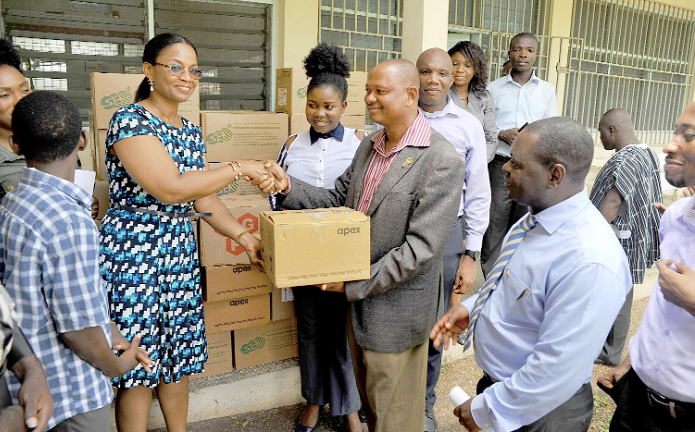
Korle Bu Sickle Cell Unit gets medical supplies
Cells in tissues need a steady supply of oxygen to work well. Normally, haemoglobin in red blood cells takes up oxygen in the lungs and carries it to all the tissues of the body.
Red blood cells that contain normal haemoglobin are disc shaped (like a doughnut without a hole). This shape allows the cells to be flexible so that they can move through large and small blood vessels to deliver oxygen.
Sickle haemoglobin is not like normal haemoglobin. It can form stiff rods within the red cell, changing it into a crescent or sickle shape.
Sickle-shaped cells are not flexible and can stick to vessel walls, causing a blockage that slows or stops the flow of blood. When this happens, oxygen can not reach nearby tissues.
The term sickle cell disease (SCD) describes a group of inherited red blood cell disorders. People with SCD have abnormal haemoglobin, called haemoglobin S or sickle haemoglobin, in their red blood cells.
Haemoglobin
Haemoglobin is a protein in red blood cells that carries oxygen throughout the body.
“Inherited” means that the disease is passed by genes from parents to their children. SCD is not contagious. A person cannot catch it, like a cold or infection, from someone else.
People who have SCD inherit two abnormal haemoglobin genes, one from each parent. In all forms of SCD, at least one of the two abnormal genes causes a person’s body to make haemoglobin S. When a person has two haemoglobin S genes, Haemoglobin SS, the disease is called sickle cell anaemia. This is the most common and often most severe kind of SCD.
An audit of the current sickle cell patients in Ghana admitted to the Sickle Cell Unit of the Korle Bu Teaching Hospital (KBTH) indicates that the hospital admits over 10,000 of such patients every year.
To assist the hospital in treating patients at the unit, the Full Gospel Business Men’s Fellowship International (FGBMI) has presented medical supplies and medicines worth GH¢4,456.85 to the unit at the Korle Bu Teaching Hospital.
The items included Folic Acid, Multivite, Amoxicilin + Clavulinic Acid, Nugel, Aluminium Hydroxide, Cororange, Metronidazole and Digestive Enzy.
The medicines were presented to the acting Director of the Ghana Institute of Clinical Genetics (GICG), Dr Yvonne Dei-Adomakoh, yesterday.
Present at the event were the Specialist Haematologist of the GICG, Dr Eugenia Asare, and the Principal Medical Officer of the GICG, Dr Fredericka Sey.
Timely donation
Dr Dei-Adomakoh described the donation as timely, adding that: “The hospital is in shortage of medicine and doesn’t have enough support for the sickle cell patients.”
She said the medicine would be given to the patients free of charge in order to help reduce the cost of their treatment.
Challenges
Dr Dei-Adomakoh stated that the large number of the sickle cell patients had made the unit congested and uncomfortable for the patients.
She also noted that the unit needed support from the government, institutions and organisations in order to operate freely and comfortably.
Appreciation
The acting director of the GICG thanked the fellowship for their assistance and concerns to the sickle cell patients and pleaded with them to do it yearly.
She urged all sickle cell patients to attend the sickle cell clinic in order to check their health conditions and also take their medications seriously.
“I appeal to the government to support the unit with infrastructure in order to admit more sickle cell patients,” she stated.
For his part, the acting Head of the Health Training Institution of the Ministry of Health, Mr Kwesi Asabir, said people suffering from sickle cell were mostly rejected in society, thus the reason for the donation to provide free medications to the patients at KBTH.
He also urged other organisations and institutions to help support people living with sickle cell in order for them to live long.
